SHAME SHAME SHAME!
“In India nowadays, the boy or girl can refuse to get married. They have full freedom, so how will things go smoothly?”
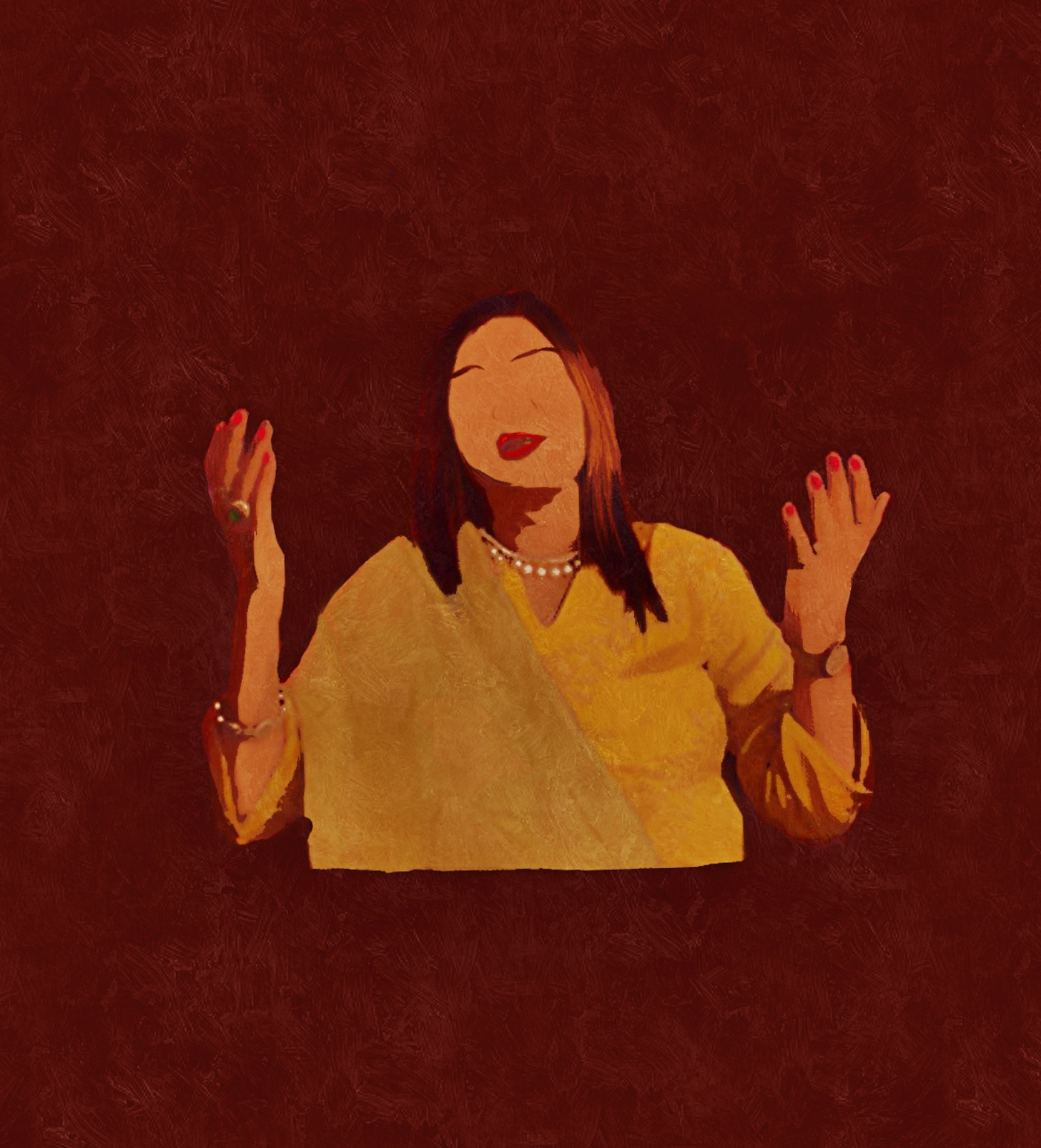
I think it’s a testament to our times that we could all be so shook by a show that talks about something as DREADED as Indian Matrimonial rigours that we created a phenomenon out of a person who’s an embodiment of the collective we call ‘elders’- Sima Taparia.
In retrospect, I must admit that I now understand where she’s coming from though my initial thoughts on the show were quite scathing and borne out of being enormously triggered -- with good reason. I put DARK on hold and started watching this…this travesty (this is me channelling a PMS ridden Arathy full of angst and anxiety). That’s how clickbaity and triggering reading the name was.
NETFLIX clearly knows how to push our buttons because the trailer has just the right amount of annoying setups to make me want to watch “just 10 minutes of the first episode” (is what I declared to myself as I clicked on the icon) to justify my diatribe against this show on the wonderful world of Twitter (which I use once every two month-this was the perfect opportunity for me to tell my 5 twitter friends that I was still active).
8 hours later
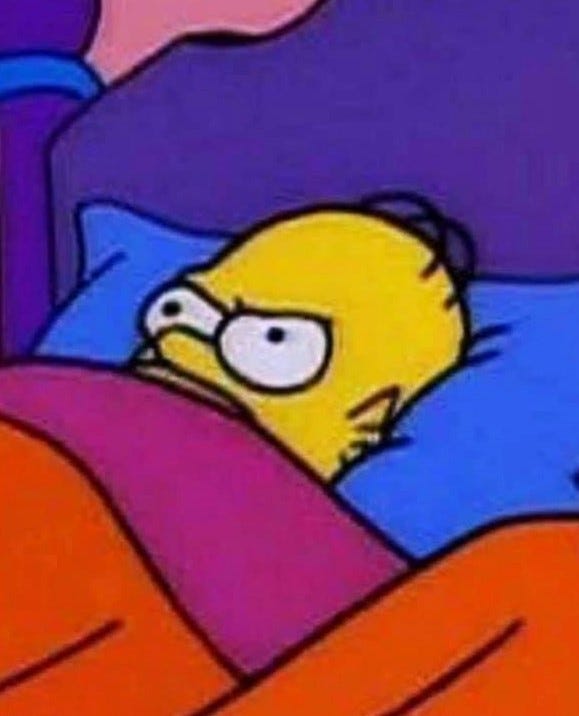
I did a lot of the whole self-righteous “I am appalled that they would make this, this is so terrible for us” but I knew then and I know now that it was plain old shame. Shame to be a part of this collective we call “Indians” and this nationality and the things that the show would now associate it with.
But hold on, this isn’t a rant piece about my hate for the show. I’d have tweeted about it if that’s all there was to it (and said hi to my now 6 twitter friends). No, there’s a lot I learnt from the experience and I’ll show you how and WHY we all learnt a little something from the phenomenon that is Indian Matchmaking, irrespective of whether one watched it or not.
WHY is a BIODATA? Yes, I said WHY.
I have nothing against a marriage that may be ‘arranged’. To each their own. What I DO have a problem with are the labels used to identify these ‘potential matches’ that reduce an individual to either a price tag or a gleaming trophy.
The slim, trim, educated statement and the constant allusion to how fair or dark-skinned a potential match was, was a thing of nightmares, especially after the Fair and Lovely debacle that had JUST happened in the country. I was practising pedantic lectures in front of the mirror explaining how messed up it is that a show like this exists. I was ready and armed to self-righteously take down anyone in defence of the show.
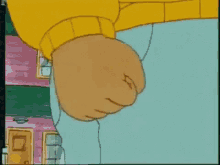
The obsession with looks and caste, the stereotypical notions of what a woman needs to be and should behave. The “I want her to be independent but also docile” conversation wasn’t just something that I saw on Television - it was something I’ve heard in my own house (This was a demand made by a cousin of my own but he still ended up in finding the ‘perfect girl’ for himself).
It reaffirmed a lot of what I’d faced growing up. The fact that I’ve been told to behave a certain way. Been asked to carry umbrellas on my way back from school so I didn’t get ‘tanned’. To be judged by relatives and even my mum for playing outside all summer. To be judged for looking a certain way and even beating myself up over looking the way I did.
Also, is it really a family get together unless every aunty passing by has proudly updated you on your weight, height and tan from the last time you met them? It represented EVERYTHING I hated about a culture that made me not love myself. It made me ANGRY. Angry for SO many men and women whom I know or have even heard of who’ve faced the most traumatizing experiences of their lives BECAUSE of the culture and I dumped all of those emotions on this one show.
To the outside world - we looked like ignorant puppeteered children and all the “Indians don’t ALL have arranged marriages” and “Arranged marriages aren’t that bad” statements would forever be tainted by this impression of us and that made me angry. Yup, I did the whole ‘Log kya kahenge’ bit, give me a break, I’m Indian.
I stop worrying?
So when a friend said “I don’t think it was THAT bad” I was seriously afraid for the mental well-being and the inherent ‘morality’ of my friend until someone said, “My Sister and I were watching it over the weekend and my mum saw a bit and she got so irritated and we were like Why? This is exactly what you guys do, and if it isn’t then why are you irritated?”
That’s when things started coming together in my head. She hated seeing what the Indian community has so easily accepted and internalized on screen. That WAS reality. It was what she and so many others like her probably did to their kids, the same way it had probably been done to her as well.
What I realized was that the show would probably evoke more of a reaction from our parents than ANY number of conversations that WE try to have with them about being ‘independent’. Trying to carve out an identity for ourselves that isn’t always going to be determined by the norms of our community is probably the biggest struggle most of us have had growing up.
A few conversations and a twitter scroll later (after I’d reigned in the lecturer in me), I realized that I was so butthurt by the show because of how REAL it was, just like so many others. Indian Twitter seemed to be handling the whole series like a BOSS and it was trolling heaven.
My favourite was Sima’s own avatar being taken on by a Tweeter (does my twitter ineptitude show yet?) and people were going out of their way to get her judgment on them. We’d taken on the labels that she’d thrown around, that SOCIETY throws around and we’d owned it. Sima Taparia was now a truth bot of sorts that we could now understand and relate to but didn’t restrict our identity to.
Hi, I’m Sima from Mumbai and this isn’t our first meeting
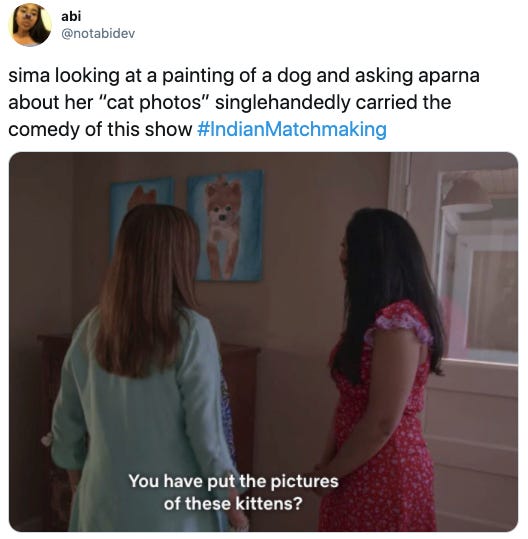
We don’t HATE Sima Aunty. We hate what she represents. The hundreds and thousands of aunties and uncles in our lives whom we’ve constantly heard repeating a version of the same thing. We HAVE people like these in our lives and watching a part of your life play on-screen can be extremely triggering. Also, don’t get me wrong, we’re not exempt from this category, our generation can be just as judgmental as them.
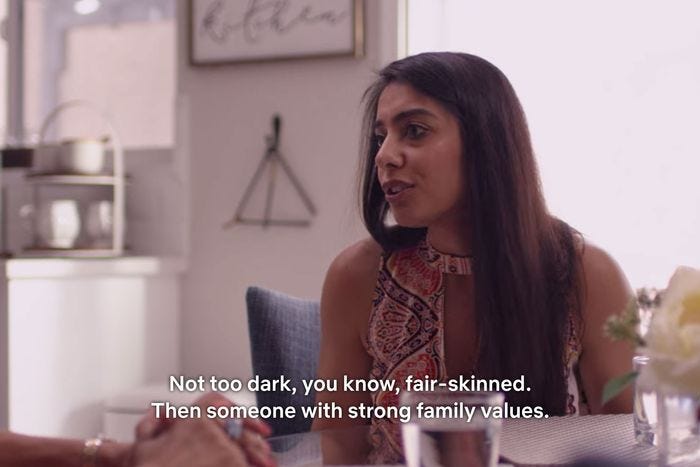
Matchmaking is her business. This is her life. She has to look at people as commodities. She CAN make statements like, ‘you have to adjust and you have to compromise’ in order to be good at her business because that’s what the market demands. That’s what our PARENTS (not all, but a large majority of them) demand.
But when it’s someone from your own family who plays that role? Someone you’d ideally want to look out for you and YOUR well-being. Someone who’s supposed to be looking out for your own good, and not supposed to be looking for brownie points to brag about at their next get-together, that feels like betrayal and I personally don’t care for the whole business.
Sima is just doing what she needs to do to survive in the market. Adapting to changing standards and customs IS a tough spot to be in and she ended up coming out a Pop Culture icon.
She’s aware of the culture and the binary way in which matchmaking works. She’s just playing into those hands because let’s face it - that’s business. Please your customers and in Indian Matchmaking, your customers are the parents.
She has forever changed the way in which people will look at arranged marriages now and I think that’s great.
I learn to appreciate EDITING
One thing I’ve learnt about the industry is that editing MAKES the story. Drama is everything. I look at these individuals as ‘archetypes’ because that’s how they’re also cast for every reality show.
Networks know that they’re way smarter and slyer than we think, so they know how to bring in the numbers for every show. Mind you, I don’t think it was amazing in any way. I really liked some of the snippets of the older couples on the show that bookended the episodes but I fast-forwarded every time any bits of Pradhyuman showed though I AM glad to have caught this little exchange.
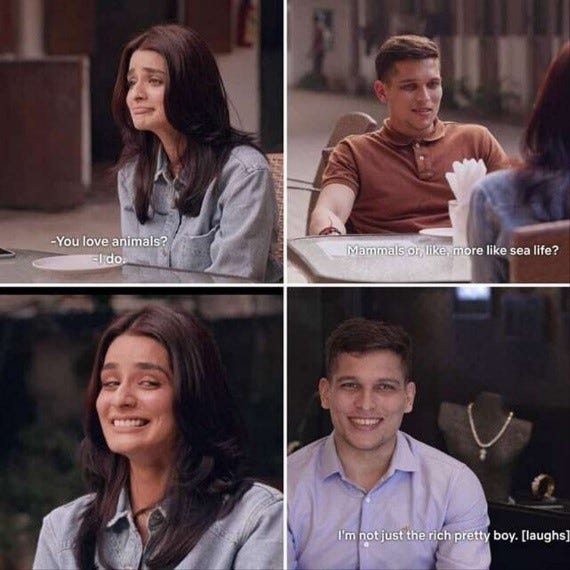
IMM showed us the lives of working-class Indian Americans and the 1% in India. They didn’t delve into the tougher topics of caste, racism, colourism and sexism because those topics aren’t easily palatable. We were shown real but glamourous lives because that’s what we prefer to consume.
Weirdly enough, this was a show actually even respected its audience enough by including the pregnant pauses after some rather harsh and discriminative statements. The cringey moments at Pradhyuman and Akshay’s house and the subtle editing that showed us that the producers were on our side and knew what’s up.
I don’t necessarily want to delve into the individuals on the show here but I have just a few things I’d like to highlight.
Yes, Aparna was initially super annoying but she also represented a part of me that always knows what it wants. She shies away from admitting it for fear of being judged while male characters like Akshay and Pradhyuman proudly admitted it and we didn’t necessarily think too much about it because we’ve accepted that most men tend to be that way.
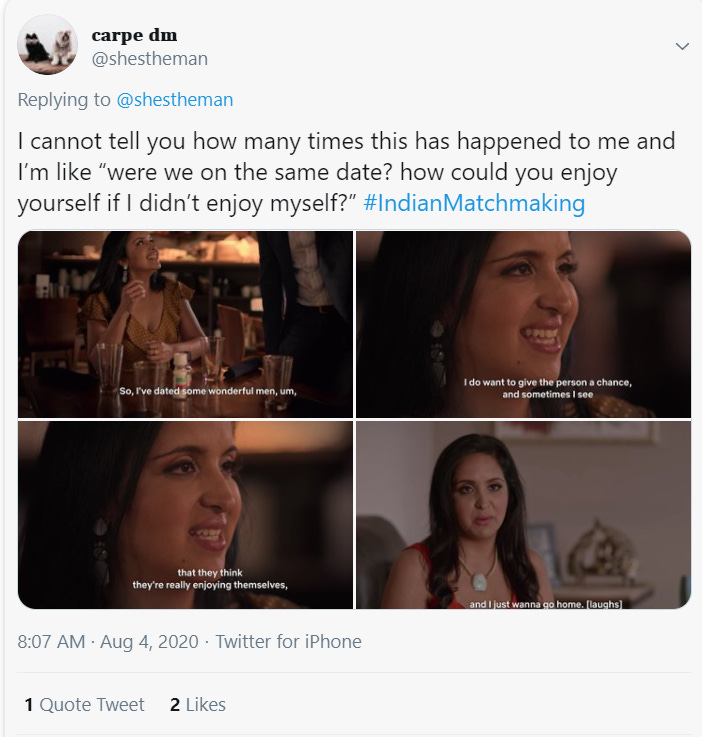
Cause ^this is true. And this below because as we’ve all learnt from experience, familiarity does often breed contempt.
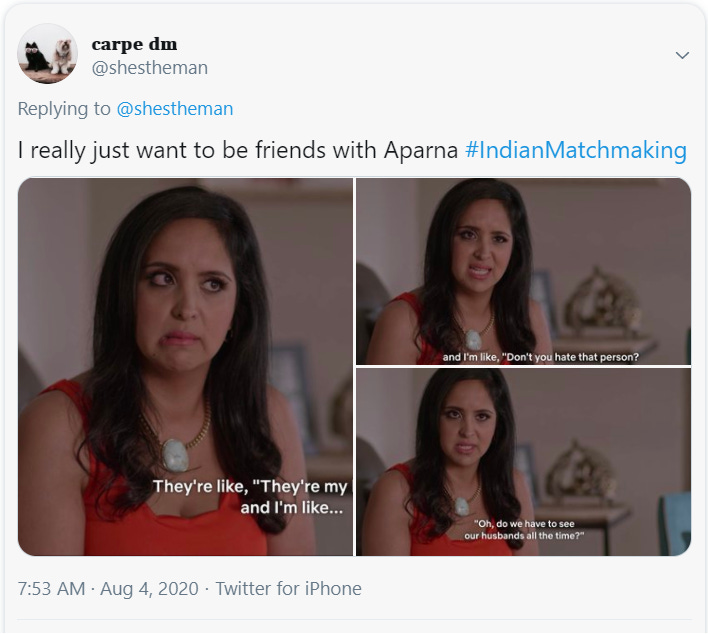
Aparna didn’t even talk about how someone ‘looked’. She spoke more about stability but sadly, this is the truth of the stereotype. Aparna was edited to be the ‘antagonist’ in the show. It’s great for that instant gratification but if you’re going to go public or DM any of these individuals, just remember that there’s a LOT more to the story than just what’s shown on your screens. (I still can’t stand Pradhyuman tho)
Is this a DOCUMENTARY or a REALITY SHOW? Or both?
I think the question finally boils down to whether Smriti Mundhra (the Executive Producer) wanted this to be a docu-series or a reality show. As a reality show, it hits all the notes and it’s what you want in good old-fashioned pOOja wHAt iS This BeHAVioR entertainment.
You have camps and sides that you pick and you have enough of the cringe-reveal moments to keep you glued to the screen yet hating yourself every minute of it. Yet, if it is claimed to be a docu-series, there’s a lot more work to be done and it isn’t nearly enough to represent the true face of the matrimonial industry in India. The show mainly dealt with working-class Indian Americans and the 1% in India
Ankita may have probably been one of the few exceptions but it isn’t NEARLY enough to give us a proper docu-series feel to it. In fact, all the hate the show got IS legit if it DOES aim to be a documentary because while the language is evidently casteist and sexist, it DOES have a duty and a responsibility to explore WHY this mentality is accepted so easily in our country.
Indian Matchmaking managed to fall somewhere in between a docu-series and a reality show. It made some people uncomfortable while others mocked the whole thing. It reached the audience that it needed to.
Maybe the generic title made it safe enough for people to click on it to see what it was about and MAYBE some people saw their ugly societal judgments staring right back at them, in the eye. Maybe THAT was needed for this all-important conversation to start.
Smriti Mundhra had tried to pitch the idea of the show to a producer in 2010 but was shot down because apparently it wasn’t white enough, and would have maybe worked if it was from the white gaze. She only got a thumbs up from Netflix because she had Sima with her when she pitched the show.
Mundhra also made an earlier documentary called A Suitable Girl that was more in line with what a lot of people have been asking for instead of IMM. It traces the lives of three women from three different stratas of our society and gave me ALL the feels that I’d wanted from IMM. Yet, I would have never even watched the documentary if it hadn’t been for the hype around IMM and the need for me to justify how much I loved hate-watching it.
Maybe this was the only way
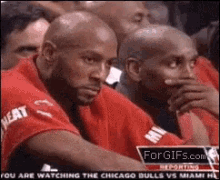
A few months ago, I was reading Sapiens (just another book that I started but will probably never finish) and remember reading about how the need for a better form of communication amongst human beings was born out of a desire to gossip. The need to communicate about which tribal leader was friends with whom and which hunter was sleeping with which gatherer so the first few complex conversations probably would have been exactly that. Thus gossip, my friends, was the ancient precursor to modern-day journalism (sigh the things I learn from half-read books).
I think I’ve realized that the reason something like Indian Matchmaking exists (though Mundra was prepared for all the criticisms we have and is hoping to do more with season 2). A critic did say (and I paraphrase here) that there’s nothing wrong with being as transparent as you are about the deep-rooted colourism, social structures, caste and this whole North Indian v. South Indian thing that was happening and the blatant way in which people were talking about it and had accepted it.
There’s nothing wrong with the transparency in showing that, but what IS irresponsible is that you’re not digging into why it is the way it is and the social structures that made it what it was.
Everyone needs this cushioning blow dealt to them because that’s the only way in which they might actually even try to think about what exactly is wrong with what they’re saying. And I’m guessing that IMM took that route.
Even if the producers didn’t want to make a point. Even if it was just another typical reality show curated for the ratings. Maybe they just wanted to hold up a mirror and say “Here, look, this is what we do and this is what we are”.
And the fact that it elicited such a reaction from us probably says a lot about how they executed that. THIS is what we’ve got. THIS is the reaction that we’ve elicited. THIS is the conversation we’re having. I think that says a lot about the show, doesn’t it?
P.S. For those of you who want to relive the show, the best moments are captured here WITH commentary on my favouritest thread (if you pay close attention you’ll hear me say ‘omg yasss’ for every single one of those posts):
- ARATHY KUSHALAPPA @emptythoughtbbl
With that, we come to the end of our first piece for PseudoPop. We hope that you enjoyed that and we look forward to seeing you again.
You can also look forward to a playlist on Monday. It should be interesting.
Don’t forget to like, share and subscribe.
You can get in touch with Arathy on twitter at @emptythoughbbl. She’s only doing this to make new friends on the bird app. She also loves baking so if you find yourself in the city of Bangalore, don’t forget to indulge yourself with some jalapeño loafers.
You can get in touch @kneadtherapy
Don’t forget to comment below. Thanks for reading.
Have a great day!





I frikkin loved this